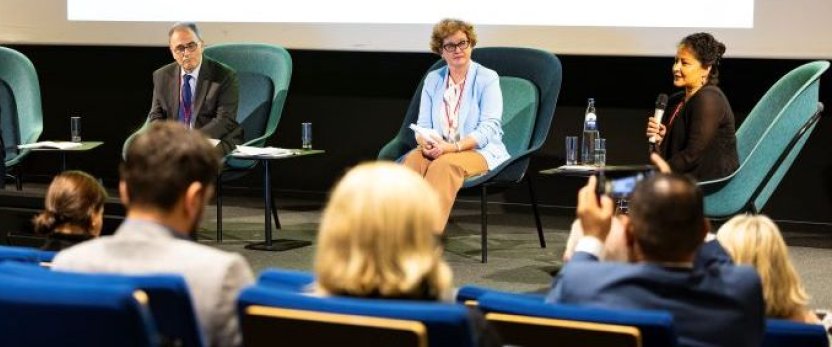Supporting Threatened Scholars Through Regional Placements
The Institute of International Education Scholar Rescue Fund (IIE-SRF) welcomed more than 120 fellows, alumni, hosts, and other partners from the higher education, government, and nonprofit sectors to Brussels for the 2024 IIE-SRF Forum on October 10.
In the forum’s final panel, IIE-SRF director James R. King moderated a conversation that explored the value of creating opportunities for threatened scholars to continue their academic work close to home. IIE-SRF’s efforts to arrange fellowships inside scholars’ home regions, or regional placements, began in 2003 when the program placed a Zimbabwean at a South African university.
King shared that these regional placements, which many scholars prefer for academic or personal reasons, “allow IIE-SRF to support a more diverse range of scholars, including those who are unable to join institutions in North America and Europe, whether due to language barriers, visa restrictions, or higher cost of living.” These arrangements also provide critically needed resources, partnerships, expertise, and solidarity to overstretched host communities receiving large displaced populations. In 2023, 30% of IIE-SRF fellows undertook placements in their home regions.
Nishi Dhupa, executive director of the Mario Einaudi Center for International Studies and associate vice provost for international affairs at Cornell University, explained a partnership model developed by IIE-SRF and Cornell to offer additional funding and professional resources to Ukrainians undertaking IIE-SRF fellowships in Eastern Europe. Cornell has hosted 11 IIE-SRF fellows since 2004, including Afghan and Venezuelan scholars who are currently on campus. Following Russia’s invasion of Ukraine, the university reached out to IIE-SRF to inquire about supporting Ukrainian scholars.
These conversations resulted in a pilot program that paired a Ukrainian scholar undertaking the IIE-SRF fellowship in Latvia with a virtual cohost at Cornell and then expanded to a second Ukrainian fellow in Poland. These scholars have benefited from their physical placements in Eastern Europe, while also broadening their networks in North America and receiving full access to Cornell’s digital library resources. Dhupa noted that the cohosted fellow in Poland, Oleksandra Shtepenko, will visit Cornell [in November] to lead a workshop, joined by colleagues from her Polish host institution.
IIE-SRF is partnering with Cornell to expand this pilot to include additional scholars, including potentially Sudanese fellows undertaking the fellowship in Egypt and South Africa. During the Q&A portion of the panel, many audience members expressed interest in learning more about this virtual cohosting model and brainstorming other models.


